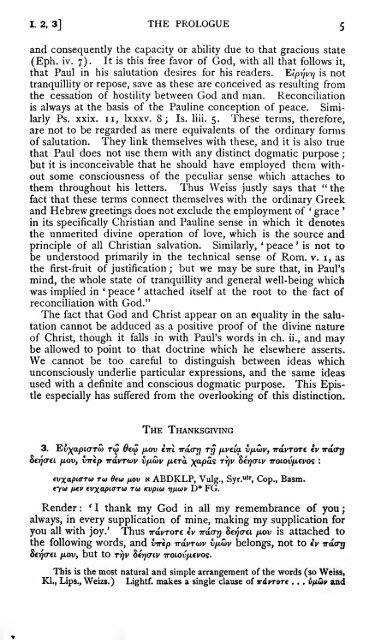Philippians and Philemon - MR Vincent - 1906.pdf
Philippians and Philemon - MR Vincent - 1906.pdf
Philippians and Philemon - MR Vincent - 1906.pdf
You also want an ePaper? Increase the reach of your titles
YUMPU automatically turns print PDFs into web optimized ePapers that Google loves.
I. 2, 3] THE PROLOGUE 5<br />
<strong>and</strong> consequently the capacity or ability due to that gracious state<br />
(Eph. iv. 7). It is this free favor of God, with all that follows it,<br />
that Paul in his salutation desires for his readers. is not<br />
tranquillity or repose, save as these are conceived as resulting from<br />
the cessation of hostility between God <strong>and</strong> man. Reconciliation<br />
is always at the basis of the Pauline conception of peace. Simi-<br />
larly Ps. xxix. II, Ixxxv. 8; Is. liii. 5. These terms, therefore,<br />
are not to be regarded as mere equivalents of the ordinary forms<br />
of salutation. They Unk themselves with these, <strong>and</strong> it is also true<br />
that Paul does not use them with any distinct dogmatic purpose ;<br />
but it is inconceivable that he should have employed them without<br />
some consciousness of the peculiar sense which attaches to<br />
them throughout his letters. Thus Weiss justly says that "the<br />
fact that these terms connect themselves with the ordinary Greek<br />
<strong>and</strong> Hebrew greetings does not exclude the employment of ' grace<br />
in its specifically Christian <strong>and</strong> Pauline sense in which it denotes<br />
the unmerited divine operation of love, which is the source <strong>and</strong><br />
principle of all Christian salvation. Similarly, * peace ' is not to<br />
be understood primarily in the technical sense of Rom. v. i, as<br />
the first-fruit of justification ; but we may be sure that, in Paul's<br />
mind, the whole state of tranquillity <strong>and</strong> general well-being which<br />
was implied in ' peace ' attached itself<br />
reconciliation with God."<br />
at the root to the fact of<br />
The fact that God <strong>and</strong> Christ appear on an equality in the salutation<br />
cannot be adduced as a positive proof of the divine nature<br />
of Christ, though it falls in with Paul's words in ch. ii., <strong>and</strong> may<br />
be allowed to point to that doctrine which he elsewhere asserts.<br />
We cannot be too careftil to distinguish between ideas which<br />
unconsciously underlie particular expressions, <strong>and</strong> the same ideas<br />
used with a definite <strong>and</strong> conscious dogmatic purpose. This Epis-<br />
tle especially has suffered from the overlooking of this distinction.<br />
€<br />
3.<br />
oerjaei ,<br />
7«<br />
The Thanksgiving<br />
€ -] 8 Trj , ficra





